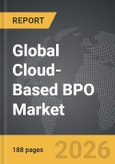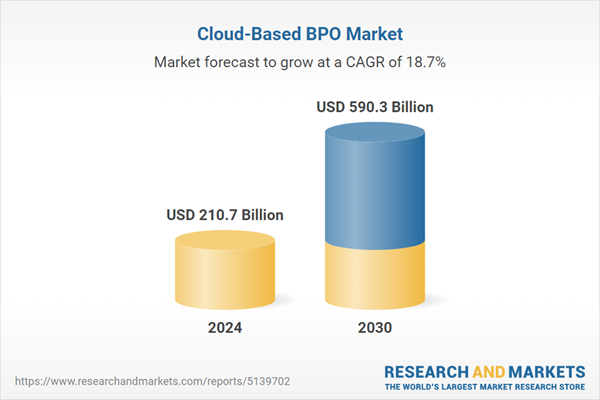Global Cloud-Based BPO Market - Key Trends and Drivers Summarized
Why Is Cloud-Based BPO Gaining Popularity?
Cloud-based Business Process Outsourcing (BPO) is rapidly gaining popularity as businesses seek more flexible, scalable, and cost-efficient ways to manage their operations. Traditional BPO models, which often rely on physical infrastructure and on-site service providers, have struggled to meet the demands of today's digital and globally distributed workforce. In contrast, cloud-based BPO offers the ability to run business processes on cloud platforms, allowing for remote delivery of services without the need for significant capital investment in IT infrastructure. This model is particularly appealing to organizations that need to scale their operations quickly and efficiently, such as during seasonal peaks or in response to market volatility. By leveraging cloud-based services, companies can dynamically adjust their resources in real-time, ensuring they only pay for what they use. Furthermore, cloud-based BPO provides a higher degree of business continuity and disaster recovery, as data and operations can be easily migrated and accessed from any location, reducing the risks associated with disruptions or outages. As digital transformation accelerates across industries, businesses are increasingly turning to cloud-based BPO to streamline their operations, enhance agility, and reduce costs.How Is Technology Driving the Evolution of Cloud-Based BPO?
Technological advancements are at the core of the evolution of cloud-based BPO, transforming how outsourced services are delivered and managed. One of the major drivers is the rise of automation and artificial intelligence (AI), which are enabling cloud-based BPO providers to deliver more efficient, accurate, and cost-effective services. AI-powered tools can handle routine, repetitive tasks, such as data entry, customer service queries, and compliance checks, freeing up human resources to focus on more complex tasks that require critical thinking and decision-making. Robotic process automation (RPA) is another technology that has taken center stage in cloud-based BPO, automating high-volume processes across various business functions such as finance, HR, and IT. The integration of AI and RPA into cloud-based BPO solutions not only reduces operational costs but also enhances speed and accuracy, driving increased adoption. Additionally, the use of big data analytics in cloud-based BPO is allowing companies to gain deeper insights into their operations, customer behavior, and market trends. These analytics capabilities help businesses make data-driven decisions, improve customer satisfaction, and optimize internal processes. The convergence of these technologies is making cloud-based BPO more attractive for companies looking to innovate and remain competitive in a rapidly evolving business environment.Why Are Businesses Transitioning to Cloud-Based BPO for Enhanced Flexibility and Cost Savings?
The transition to cloud-based BPO is largely driven by the need for greater flexibility, cost savings, and operational efficiency. In the traditional BPO model, businesses often faced limitations due to fixed infrastructure and long-term contracts that lacked agility. Cloud-based BPO changes this by offering a pay-as-you-go model, where companies only pay for the services and resources they consume, making it a more cost-effective option. This flexibility is crucial for businesses that experience fluctuating workloads, such as e-commerce companies during peak shopping seasons or financial institutions at the end of the fiscal year. Furthermore, cloud-based BPO enables organizations to scale their operations up or down quickly based on market conditions or internal requirements. This on-demand scalability eliminates the need for significant upfront capital investments and allows for more responsive, agile operations. In addition to financial benefits, cloud-based BPO enhances the ability to work remotely, which has become a critical requirement in today's increasingly mobile and distributed workforce. By hosting BPO services in the cloud, employees and service providers can access applications and data securely from any location, ensuring business continuity and productivity regardless of geographic barriers.What Are the Key Drivers of Growth in the Cloud-Based BPO Market?
The growth in the cloud-based BPO market is driven by several key factors, including the increasing demand for digital transformation, the rising need for scalability and flexibility, and the integration of advanced technologies like AI and automation. One of the primary drivers is the rapid shift towards digital business models, as companies seek to streamline operations and reduce costs by leveraging cloud technologies. Cloud-based BPO aligns perfectly with these goals by providing scalable, on-demand outsourcing solutions that can adapt to changing business needs. Additionally, the growing reliance on remote work, accelerated by the COVID-19 pandemic, has highlighted the importance of cloud-based solutions that enable distributed teams to collaborate and access critical services from anywhere in the world. As more businesses adopt hybrid and remote work models, cloud-based BPO is becoming essential for maintaining operational continuity and flexibility. The increasing adoption of AI, machine learning, and robotic process automation (RPA) is also fueling market growth, as these technologies help BPO providers deliver more efficient, cost-effective services. By automating routine tasks and enabling predictive analytics, cloud-based BPO providers can offer enhanced value to their clients while reducing errors and turnaround times. Additionally, the expansion of cloud infrastructure globally, combined with regulatory frameworks that favor cloud adoption, is further driving the uptake of cloud-based BPO solutions. Lastly, industries with stringent compliance and data security requirements, such as healthcare, finance, and legal services, are increasingly turning to cloud-based BPO for secure, compliant, and scalable outsourcing solutions, ensuring that sensitive data is protected while optimizing operational efficiency.Report Scope
The report analyzes the Cloud-Based BPO market, presented in terms of market value (USD). The analysis covers the key segments and geographic regions outlined below.- Segments: Segment (Human Resource, eCommerce, Finance & Accounting, Sales & Marketing, Customer Care, Other Segments).
- Geographic Regions/Countries: World; United States; Canada; Japan; China; Europe (France; Germany; Italy; United Kingdom; and Rest of Europe); Asia-Pacific; Rest of World.
Key Insights:
- Market Growth: Understand the significant growth trajectory of the Human Resource segment, which is expected to reach US$184.2 Billion by 2030 with a CAGR of 15.3%. The eCommerce segment is also set to grow at 22.3% CAGR over the analysis period.
- Regional Analysis: Gain insights into the U.S. market, valued at $60.3 Billion in 2024, and China, forecasted to grow at an impressive 18.3% CAGR to reach $92.5 Billion by 2030. Discover growth trends in other key regions, including Japan, Canada, Germany, and the Asia-Pacific.
Why You Should Buy This Report:
- Detailed Market Analysis: Access a thorough analysis of the Global Cloud-Based BPO Market, covering all major geographic regions and market segments.
- Competitive Insights: Get an overview of the competitive landscape, including the market presence of major players across different geographies.
- Future Trends and Drivers: Understand the key trends and drivers shaping the future of the Global Cloud-Based BPO Market.
- Actionable Insights: Benefit from actionable insights that can help you identify new revenue opportunities and make strategic business decisions.
Key Questions Answered:
- How is the Global Cloud-Based BPO Market expected to evolve by 2030?
- What are the main drivers and restraints affecting the market?
- Which market segments will grow the most over the forecast period?
- How will market shares for different regions and segments change by 2030?
- Who are the leading players in the market, and what are their prospects?
Report Features:
- Comprehensive Market Data: Independent analysis of annual sales and market forecasts in US$ Million from 2024 to 2030.
- In-Depth Regional Analysis: Detailed insights into key markets, including the U.S., China, Japan, Canada, Europe, Asia-Pacific, Latin America, Middle East, and Africa.
- Company Profiles: Coverage of players such as Accenture PLC, Atos SE, Capgemini SE, Capita PLC, CGI Group, Inc. and more.
- Complimentary Updates: Receive free report updates for one year to keep you informed of the latest market developments.
Some of the 29 companies featured in this Cloud-Based BPO market report include:
- Accenture PLC
- Atos SE
- Capgemini SE
- Capita PLC
- CGI Group, Inc.
- Genpact
- HCL Technologies Ltd.
- IBM Corporation
- Oracle Corporation
- Xerox Corporation
This edition integrates the latest global trade and economic shifts into comprehensive market analysis. Key updates include:
- Tariff and Trade Impact: Insights into global tariff negotiations across 180+ countries, with analysis of supply chain turbulence, sourcing disruptions, and geographic realignment. Special focus on 2025 as a pivotal year for trade tensions, including updated perspectives on the Trump-era tariffs.
- Adjusted Forecasts and Analytics: Revised global and regional market forecasts through 2030, incorporating tariff effects, economic uncertainty, and structural changes in globalization. Includes historical analysis from 2015 to 2023.
- Strategic Market Dynamics: Evaluation of revised market prospects, regional outlooks, and key economic indicators such as population and urbanization trends.
- Innovation & Technology Trends: Latest developments in product and process innovation, emerging technologies, and key industry drivers shaping the competitive landscape.
- Competitive Intelligence: Updated global market share estimates for 2025, competitive positioning of major players (Strong/Active/Niche/Trivial), and refined focus on leading global brands and core players.
- Expert Insight & Commentary: Strategic analysis from economists, trade experts, and domain specialists to contextualize market shifts and identify emerging opportunities.
Table of Contents
Companies Mentioned (Partial List)
A selection of companies mentioned in this report includes, but is not limited to:
- Accenture PLC
- Atos SE
- Capgemini SE
- Capita PLC
- CGI Group, Inc.
- Genpact
- HCL Technologies Ltd.
- IBM Corporation
- Oracle Corporation
- Xerox Corporation
Table Information
| Report Attribute | Details |
|---|---|
| No. of Pages | 188 |
| Published | January 2026 |
| Forecast Period | 2024 - 2030 |
| Estimated Market Value ( USD | $ 210.7 Billion |
| Forecasted Market Value ( USD | $ 590.3 Billion |
| Compound Annual Growth Rate | 18.7% |
| Regions Covered | Global |









